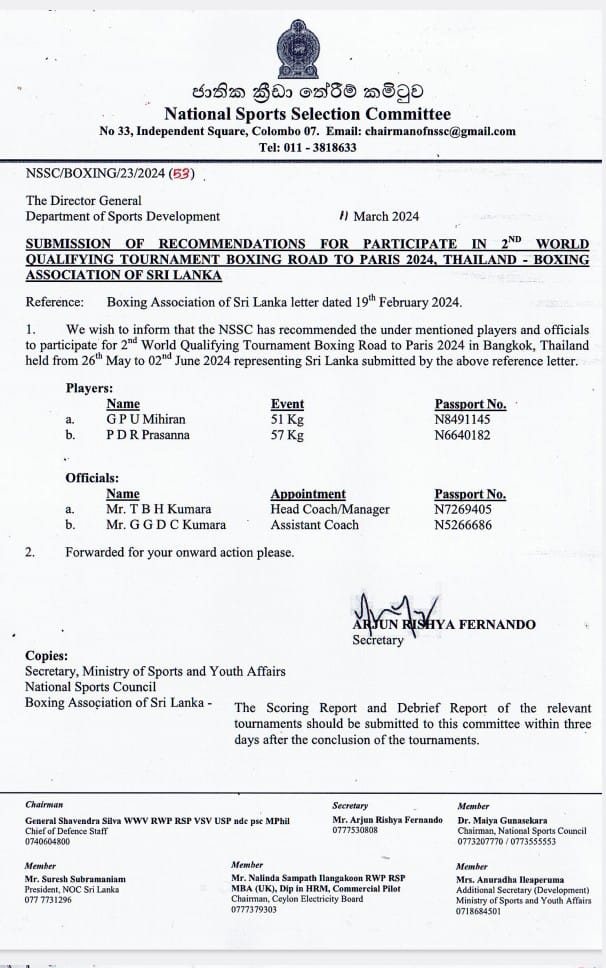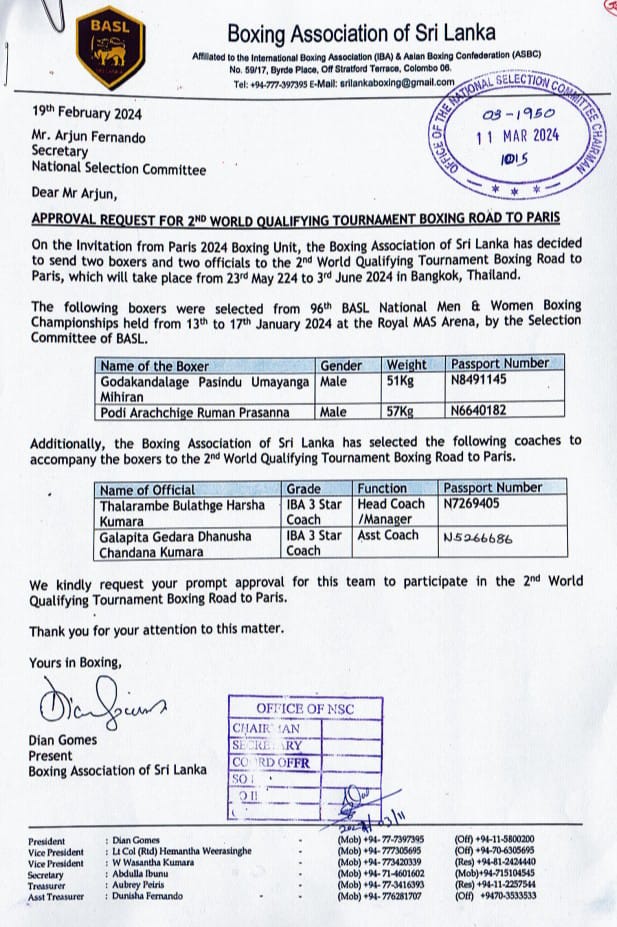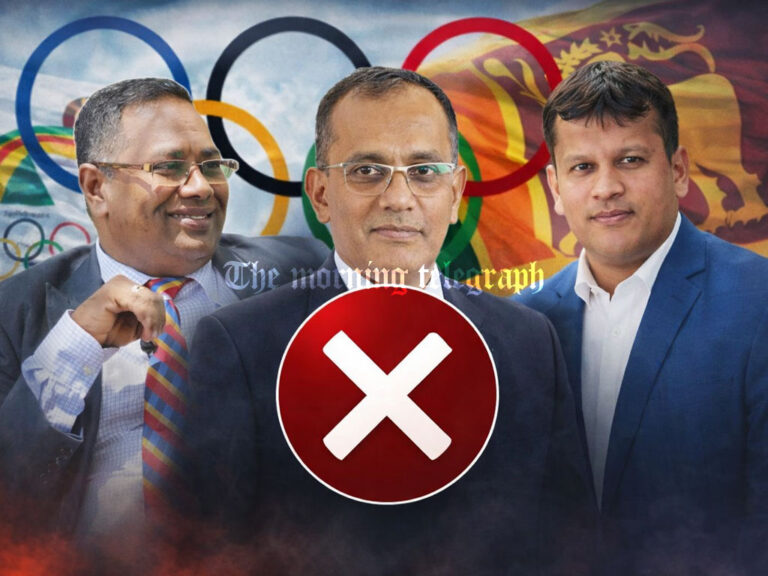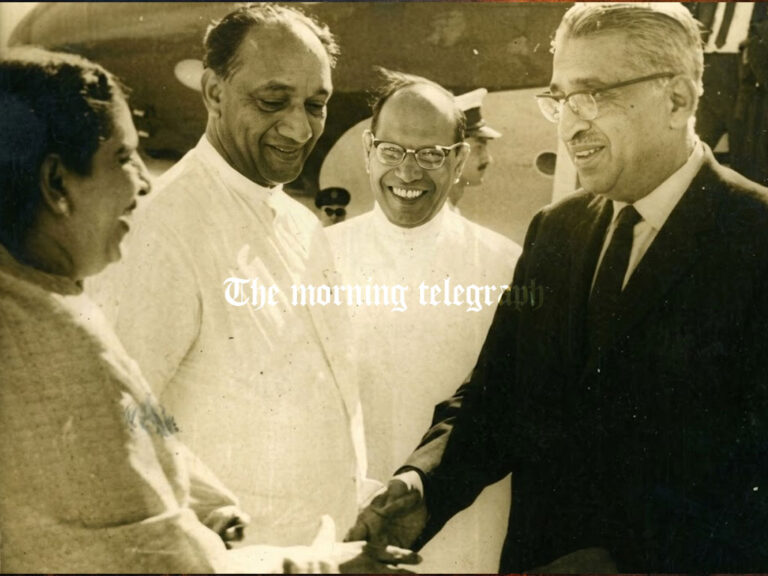
- Investigation currently underway despite NSSC approving two-man team earlier
- IOC’s introduction of gender equality for female Olympic boxers ignored by BASL
The controversy surrounding the selection of boxers Rumal Prasanna and Umayanga Mihiran for the Paris 2024 Boxing Selection Trials exposes a significant quandary in the sporting framework, with a particular focus on the integrity and legality of sports selection processes.
The basis of the ethical argument revolves around the constitution of the Boxing Selection Committee, which is required to adhere strictly to both national sports laws and international sporting standards. The Sports Law Act No. 25 of 1973 stipulates that all selection committees must be properly constituted to carry out their duties effectively and transparently.
However, the absence of a chairman and the participation of an International Olympic Committee suspended member on the selection committee during the National Boxing Tournament, where Prasanna and Mihiran were selected, cast a shadow over the legitimacy of the entire selection process.
Firstly, the absence of Gen. (Rtd) Jagath Jayasuriya, who resigned prior to the tournament, left the committee without its official chair. This vacancy is critical, as the chairperson plays a pivotal role in overseeing the selection process and ensuring its fairness and compliance with set guidelines. The absence of such a leadership figure raises concerns about the procedural integrity of the selection process.
Secondly, the involvement of Udeni Kiridena, who was under suspension by the IOC for alleged corruption after the Rio 2016 Olympic Games, is particularly troubling. His participation in the selection process, despite being explicitly against the country’s sports laws, seriously undermines the credibility of the selection outcomes. The law clearly prohibits individuals under such punitive measures from holding positions that influence athlete selection, aiming to preserve the purity and fairness of sporting competitions.

Furthermore, the revelation that another member, H.S. Caldera, was practically inactive in the boxing community and barely involved in the selection process further dilutes the legitimacy of the committee’s decisions. It is believed that selector H.S. Caldera, a man of strict principles had abstained from working with this team due to Udeni Kiridena’s appointment being in violation of the country’s Sports Law.
The legal requirement, as stipulated, is for a quorum of at least three active and eligible selectors to endorse any selection decision. With two members, in chairman Gen. (Rtd) Jayasuriya no longer in existence and H.S. Caldera uninvolved, the committee was left with one IOC suspended official in Udeni Kiridena and with only two other legitimate selectors in T.S.Weerasena and Tharanga Aruggoda in the fray to sign off the selection sheet of the two selected boxers Rukmal Prasanna and Umayanga Mihiran.
It is reliably learnt that the Paris Boxing Unit and IOC have both been informed of Selector Udeni Kiridena’s active involvement in this process.
From an ethical and procedural perspective of integrity, the selection of Prasanna and Mihiran thus appears to be procedurally flawed and potentially invalid. The lack of a properly constituted selection committee as required by national and international sports law not only questions the fairness of the selection but also exposes the entire process to debatable challenges. The athletes themselves face uncertainty about their participation, which could have been avoided with adherence to the established legal and procedural norms.
The case exemplifies the critical need for strict compliance in sports governance. It underscores the importance of transparency, accountability, and legality in sports administration, particularly in the context of athlete selection. Failure to adhere to these principles not only jeopardizes the careers of individual athletes but also compromises the integrity of the sporting discipline at large.

Further the BASL President Dian Gomes in his letter states that only two names were selected for the Bangkok Trials which he himself states was at the invitation of the Paris Boxing Unit.
Please note that the Paris Boxing Unit invitation was extended to a total of 13 boxers, (7 male and 6 female) to come forward and participate for possible selection for the Paris 2024 Olympic Games.
Gomes’ decision to send two male boxers also undermines the stance that has been employed by the PBU at this years’ Olympic Games, where gender equality has been brought in to support female boxers. The number of participants and spots have also been increased to offer a balance between both genders. The BASL quite sadly did not send a single female boxer to the first two trials that was held at the Asian Games in 2023 and in Italy in March 2024. Now the BASL has decided not to send a female to the Bangkok third and final trial for Olympic Qualification.
However, two boxers namely female boxer Nadeeka Ranasinghe (50kg) and male boxer Niraj Wijewardena (71kg) presented their cases appealing to both the Ministry of Sports and also the NOCSL seeking their assistance to attend the PBU’s Bangkok Invitational Trials.
Quite sadly, the Ministry of Sports appointed Chairman of the National Sports Council Dr. Maiya Gunasekara denied the two boxers a fair hearing into their appeals and rather disdainfully informed the Director General Shemal Fernando attached to the Ministry of Sports of his decision.
BASL’s Gender Bias in Selection Draws Criticism and Concerns
The situation surrounding the selection and non-selection of athletes for the Bangkok trials for the Paris 2024 Olympic Games raises ethical concerns of integrity. Dian Gomes, President of the Boxing Association of Sri Lanka (BASL), reportedly selected only two male boxers for the trials, despite an invitation from the Paris Boxing Unit (PBU) for a total of 13 athletes, including seven males and six females. This decision not only seems to contradict the PBU’s efforts to promote gender equality in the sport but also appears to disregard the broader legal principles of fairness and equal opportunity that should govern athletic selections.
Firstly, the act of sending only male representatives, especially when the PBU had made clear its intention to balance gender representation, potentially violates principles of equality and non-discrimination. These principles are not only ethical standards but are often enshrined in national and international sporting regulations and could be seen as a legal misstep by the BASL. The organization’s decision undermines the international efforts toward gender equality in sports, a crucial issue that has received significant attention and support globally.
NSC Chairman Dr. Maiya Dismisses Boxers Appeals with Disdain
Furthermore, the refusal to send female boxers to both previous trials in Asia and Italy, and now to Bangkok, despite qualified athletes like Nadeeka Ranasinghe expressing interest and actively seeking support to participate, may constitute a form of discrimination. This situation could challenge the BASL, as it may be failing to provide equal opportunities to male and female athletes, a requirement often stipulated by both national sports laws and international regulations governing Olympic sports bodies.
Moreover, the reported denial of a fair hearing for the appeals of Ranasinghe and her male counterpart Niraj Wijewardena by Dr. Maiya Gunasekara, the Chairman of the National Sports Council, highlights a potential breach of procedural justice. Athletes must be granted a fair process to contest decisions that affect their careers, particularly when such decisions may prevent them from competing at significant events like the Olympic Games. This denial of a fair hearing could be seen as a violation of the athletes’ rights under various sports governance frameworks, which emphasize transparency, fairness, and accountability.
From a legal standpoint, the actions taken by the BASL and the response from the National Sports Council may expose them to claims of discrimination and procedural unfairness. The International Olympic Committee, which has stringent regulations against discrimination and mandates fair processes is bound to express its disappointment regarding this exposed now issue.
This case emphasizes the importance of adhering to ethical standards in sports management, especially concerning gender equality and fair procedural practices. It also highlights the potential legal ramifications for sports bodies that fail to uphold these standards, which could include penalties that athletes may suffer further, and a loss of credibility both nationally and internationally, thanks to the BASL.







